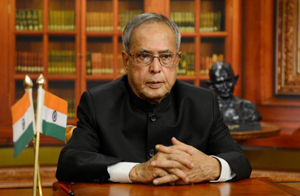New Delhi, Oct 7: President Pranab Mukherjee today said the core values of diversity, tolerance and plurality of Indian civilisation must be kept in mind and cannot be allowed to be wasted, in remarks that come against the backdrop of the Dadri lynching over rumours of beef eating.
"I firmly believe that we cannot allow the core values of our civilization to be wasted and the core values is what over the years the civilization celebrated diversity, promoted and advocated tolerance, endurance and plurality.
"These core civilization values keep us together over the centuries. Many ancient civilizations have fallen. But that is right that aggression after aggression, long foreign rule, the Indian civilization has survived because of its core civilizational values and we must keep that in mind. And if we keep those core values in mind, nothing can prevent our democracy to move," he said.
The President’s remarks come in the wake of lynching of a 50-year-old man in Dadri, Uttar Pradesh by an enraged mob over rumours that he stored and consumed beef, which has sparked an outrage across the country.
The President was handed over a coffee-table book on him at a function at the Rashtrapati Bhawan here. The book written by Prabhu Chawla, Editorial Director of New Indian Express, was released by Vice President Hamid Ansari.
Home Minister Rajnath Singh. Union Minister Mukhtar Abbas Naqvi, Delhi Chief Minister Arvind Kejriwal, Leader of Opposition in Rajya Sabha Ghulam Nabi Azad, fromer Jammu and Kashmir Chief Minister Farooq Abdullah and MPs were also present at the function.
In his brief 15-minute address, Mukherjee said being a political leader all along he felt shy speaking at such an occasion where a book on him was written.
He said the country has made tremendous progress in many sectors and there is no limit to doing more.
"There is no limit. We will have to do much more," he said.
He added that there is no end to work in the President's office which is considered stricly Constitutional and recalled how his friends jokingly commented that he would not have anything much to do in the post.
"I in my own way am making my contribution to make the country more important... After three years of coming here, I recognise that much more is to be done. There is no end to working in the President's office, which is considered strictly constitutional," he said.
Lauding the strength of democracy in the country, the President said its electorate decisively decided to put an end to the era of coalition and gave a single party government.
"Despite their diversity and despite having a long period of absence of single party majority, the Indian electorate decisively decided to make an end of that. Many of us thought that perhaps an era of ccoaltion has reached and that no single party would ever come (to power).
"In true sense, the marvel of Indian democracy has its own strength and we must celebrate that," he said.
He said he has closely seen many important events in the country happen before him right from the first election when people wondered how an election covering 350 million people can take place smoothly, to the last one.
He also recalled his days when he entered Parliament as a member of the Rajya Sabha during a "turbulent period" when Congress faced a major crisis over bank nationalisation and eventually split.
The President also recalled his mother telling him to go to school walking 10 kms everyday and that impacted his mind to strive hard when there is "no option".
He lauded the work of Prabhu Chawla, who along with his team put the book together, describing it as a "gift" from his friends and near and dear ones.
Ansari said the book is a small tribute to an eminent personality, who has a range of experience and depth of understanding issues.
Praising the book, Rajnath Singh said to put Mukherjee's life in a book is difficult to do so for such a personality who has not been in politics only to be in power and one who had strived successfully to bring about consensus in Parliament on many issues.
"He played the most important role in bringing about consensus," the Home Minister said.





Comments
Add new comment